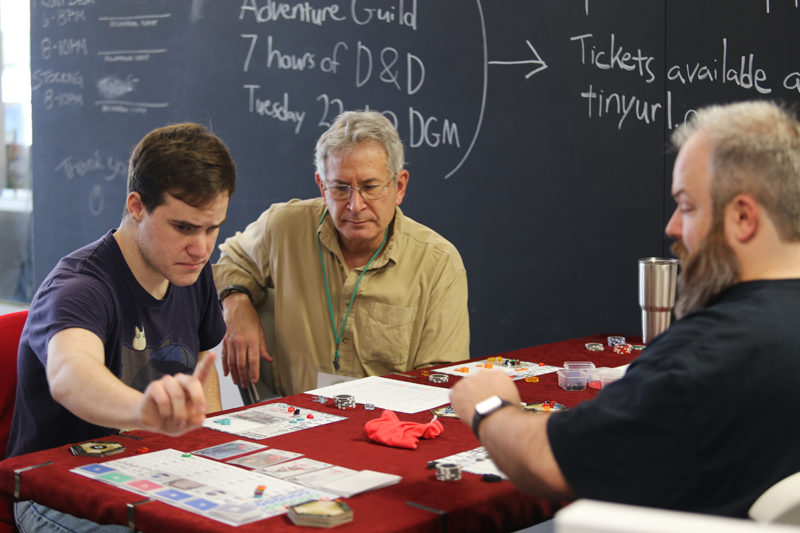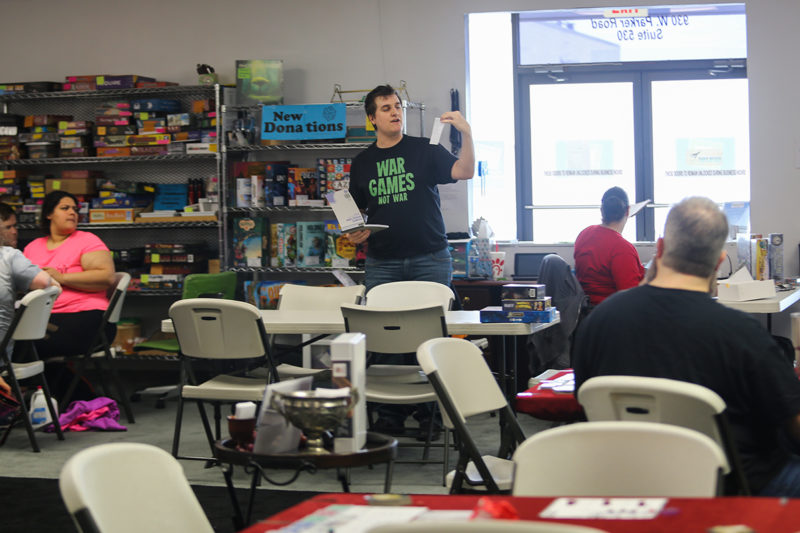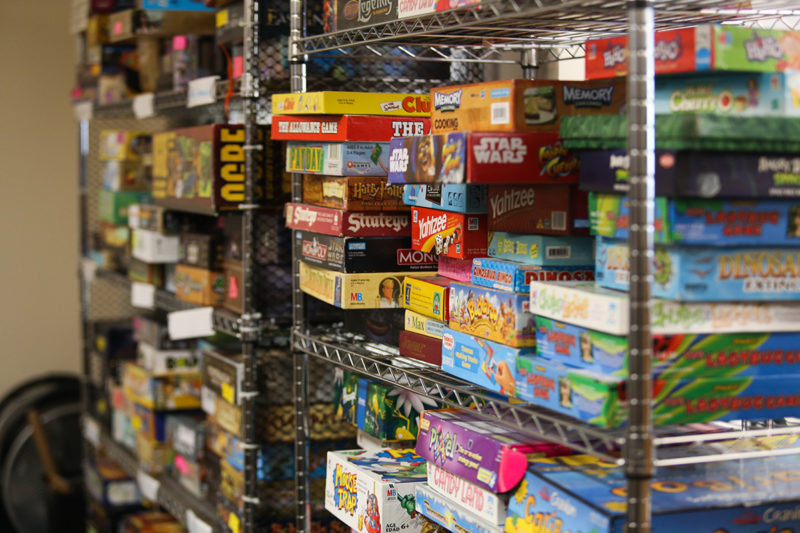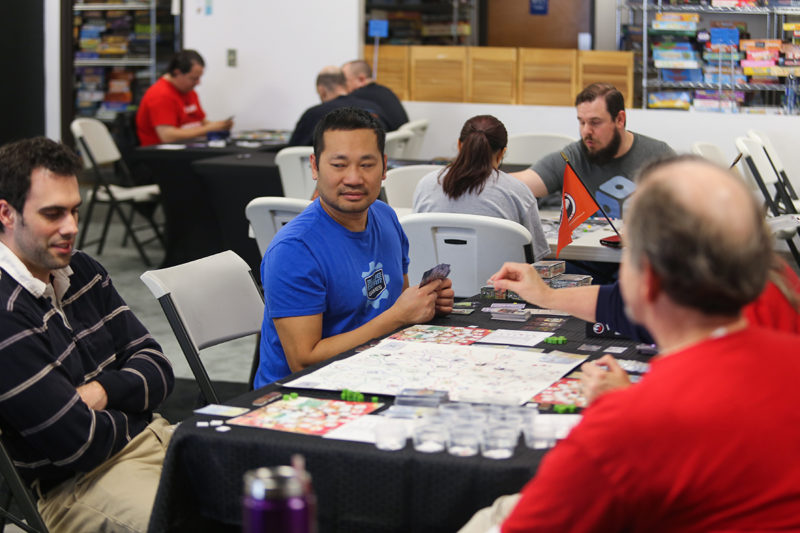Texas Plays Its Role in America’s Board-Game Comeback
By Katherine Corley
Reporting Texas

From left, Scott Stenger and Lonny Danchik battle each other in designer Ryan Abrams’, right, prototype game “Fault: Mayhem and Money in a Mismanaged Mine,” in which players compete to build the best gem mining company. Katherine Corley/Reporting Texas
On a rainy Saturday morning in February, about 50 people crowded the Dallas Games Marathon event center, a clubhouse for board game enthusiasts located in a beige strip mall in the Dallas suburb of Plano. The casual space is chockablock with shabby couches, white plastic tables and a library of 1,700 board games.
The attendees braved the weather to attend a monthly meetup dubbed the Tabletop Artisan’s Workshop, which gives amateur board game designers the opportunity, for $20, to have members of the public play-test their new creations and offer feedback.
After losing ground to digital gaming in recent decades, tabletop board games are enjoying a nationwide resurgence. Sales of hobby board games in the U.S. and Canada have grown from $100 million in 2013 to $345 million in 2017, according to the gaming trend site ICv2.com. This surge of interest has spawned an increase in amateur board game developers, particularly in Lone Star hotspots Dallas and Austin.
Public input is key to designing a successful game, says workshop organizer 38-year-old Brad Shankle, known as Bryn Smith in gaming circles. “You don’t want a [fellow] designer praising you for … your game, and then have the public say, yeah, but it’s boring. You need that feedback,” Shankle said.

Tabletop Artisan Workshop organizer Brad Shankle, aka. Bryn Smith, welcomes playtesters and game designers to the convention and instructs them how to fill out their ballots to vote on the best new game at the workshop. Katherine Corley/Reporting Texas
Today’s designers are creating Euro-style games, or Eurogames, which test players’ ability to strategize and think tactically rather than rely on sheer luck, according to the popular site BoardGameGeek.com. The games typically prize comparative achievement over direct conflict — a far cry from your grandparents’ roll-of-the-dice diversions such as the board games Monopoly and Sorry.
Shankle loves the genre, he said, because it fosters “social activity that isn’t drinking” and productively engages his brain.
The most popular Eurogames include Ticket to Ride, which has sold over six million copies by challenging players to claim the highest number of optimal railway routes between major American or European cities. Settlers of Catan, a German game in which players compete to build colonies by trading resources and constructing roads, helped establish Eurogames in the U.S. market in 1996.
Developing such complex games can involve years of evenings and weekends focused on creating a theme, crafting game mechanics, brainstorming graphic art and searching for that “it” factor that makes the game addictively fun.

Dallas Games Marathon boasts a collection of 1700 board games, filling three walls of floor-to-ceiling shelves, for members and guests to play. Katherine Corley/Reporting Texas
At Tabletop’s workshop in February, Harvey and Carlie Cornell staked out a table for the day to play-test their newest game, Tree of Life, in which players race to complete three spirit journeys, each one based on a virtue such as discipline and humility. The Cornells own Dragon Phoenix Games, a board game development company in Mansfield.
“Making a lot of money would be nice, but I don’t really expect that,” Harvey said. “I just want to make a comfortable living and do something I really love.”
Harvey says he has drafted 27 game designs in the past five years. Carlie, a graphic artist by trade, shapes the look of each game. Harvey currently works as the owner of several Subway restaurants in the Dallas-Fort Worth area, but he dreams of publishing a hit game one day so he can design full-time.
For a hobbyist, the leap to game publication can be daunting. It means finding money for manufacturing, marketing and distribution of game sets. Few designers can self-fund, so many turn to crowd-financing sites like Kickstarter. American manufacturing plants can be pricey, so many designers use printers in China, which adds international shipping costs. To top it off, the sheer glut of new games and aspiring designers has amplified market competition.
Dallas captured a piece of the tabletop game movement when Scott Alden and Derk Solko developed the popular website BoardGameGeek.com in 2000. Virtually all amateur and professional game designers maintain a presence on the website. In 2005, Alden and Solko hatched the idea for a spinoff board game convention in Dallas called BGG.CON. The convention thrives today, drawing a national gaming clientele to North Texas every year.
Full-time game designer Justin De Witt, owner of Fireside Games in Austin, said that Texas’ capital city is another hub for designers because of its talent pool in creative industries such as graphic arts and printing. “The creativity of the city [makes it a] fun place to work because you’ve got a lot of talent up and down the chain,” De Witt said. As an additional draw, Austin is also home to Steve Jackson Games, a board gaming company founded in 1980.

Caleb Segura, left, and Linh Nguyen, middle, learn the nuts and bolts of Harvey and Carlie Cornell’s, right, newest game Tree of Life. Both Nguyen and Segura are also game designers. Katherine Corley/Reporting Texas
Despite the challenges, some amateurs succeed in turning game design into a full-time job. De Witt says he worked on his first game, Castle Panic, for 10 years before he and his wife scraped together about $20,000 to start their own business and self-fund the publication of Castle Panic in 2009. The game sold out its first print run of 3,500 games in 10 weeks.
“Every penny that came in went back into making more games,” De Witt said. “I didn’t take a paycheck for five years until … we were making enough that we can afford to pay ourselves.”
Despite the hardships, De Witt says Fireside Games has been profitable every year since its launch, though business has slowed somewhat as the market grew more competitive. His current goal? He says he hopes this is the last job he’ll ever have.
“When you make something new and you realize, oh, this is going to work. … There’s nothing quite like that,” De Witt said. “I don’t just make products — I make things that people enjoy.”